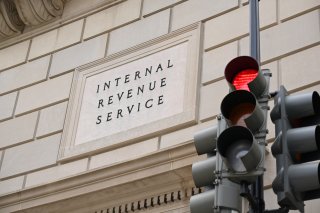Can’t Afford Your Taxes? The IRS Might Have You Covered
There are three primary options for Americans who can't pay their taxes in full this tax season.
With the Tax Day deadline of April 18 fast approaching, this Easter weekend might not be all that pleasant for millions of Americans. And for taxpayers who need to pay up to the Internal Revenue Service (IRS), it could be a costly mistake not to meet that important deadline.
For those individuals who are subject to a failure-to-file penalty—and don’t request an extension—know that it comes out to 5 percent of the unpaid tax one owes for each month or part of a month that the tax return is late. The maximum penalty, though, is capped at 25 percent of the outstanding balance.
Furthermore, taxpayers should make sure not to forget about the late payment penalty, which comes out to 0.5 percent of the outstanding balance for every month or part of a month that one is late. Like the failure-to-file penalty, the late payment penalty is also capped at 25 percent of the outstanding balance.
However, there is another pressing issue that could come up after filing: not having enough funds to cover the outstanding tax bill. In such cases, experts say that many Americans could take advantage of a number of available payment options. According to personal finance expert Kate Dore at CNBC, taxpayers mired in this situation should look at three options in particular.
Installment Agreement
The installment agreement is a long-term monthly payment plan through the IRS that can be applied for online, by phone, or through a bot.
“You may qualify if you owe $50,000 or less, including tax, penalties and interest, but the agency won’t approve the plan with unfiled returns,” Dore writes. “Of course, you’ll want to agree to an affordable monthly payment, and you’ll need to pay future taxes on time to avoid defaulting on your agreement,” she continues, citing advice from the Taxpayer Advocate.
Offer in Compromise
This option, known as an offer in compromise, might allow a taxpayer to settle for a lesser amount than what they really owe. Taxpayers can use the Offer In Compromise Pre-Qualifier tool to see if they qualify before submitting an application from the Offer in Compromise Booklet.
“If you can show that you have financial challenges, you may be able to reduce the liability and settle it with finality to put the tax behind you so you can move forward,” said National Taxpayer Advocate Erin Collins, per CNBC.
Currently Not Collectible
According to Dore, “there’s also a ‘currently not collectible’ status, where the IRS may back off from trying to receive unpaid balances for a period of time.”
However, the caveat is that, if approved, the unsettled debt might continue to accrue penalties and interest. Moreover, the agency might tap into your future refunds to cover the balance.
Ethen Kim Lieser is a Washington state-based Finance and Tech Editor who has held posts at Google, The Korea Herald, Lincoln Journal Star, AsianWeek, and Arirang TV. Follow or contact him on LinkedIn.
Image: Reuters.

